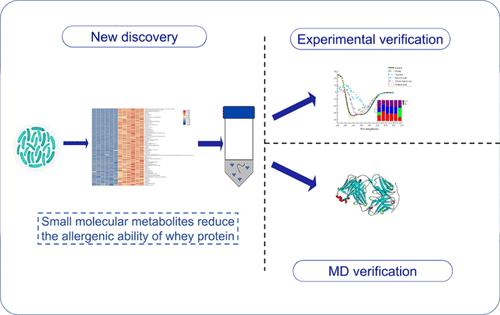当前位置:
X-MOL 学术
›
J. Agric. Food Chem.
›
论文详情
Our official English website, www.x-mol.net, welcomes your feedback! (Note: you will need to create a separate account there.)
Modulating Whey Proteins Antigenicity with Lactobacillus delbrueckii subsp. bulgaricus DLPU F-36 Metabolites: Insights from Spectroscopic and Molecular Docking Studies
Journal of Agricultural and Food Chemistry ( IF 5.7 ) Pub Date : 2024-06-28 , DOI: 10.1021/acs.jafc.3c08874 Zhao Zhang 1 , YunPeng Xu 1 , Xinling Li 2 , Lei Chi 3 , Yue Li 3 , Chao Xu 3 , Guangqing Mu 1 , Xuemei Zhu 1
Journal of Agricultural and Food Chemistry ( IF 5.7 ) Pub Date : 2024-06-28 , DOI: 10.1021/acs.jafc.3c08874 Zhao Zhang 1 , YunPeng Xu 1 , Xinling Li 2 , Lei Chi 3 , Yue Li 3 , Chao Xu 3 , Guangqing Mu 1 , Xuemei Zhu 1
Affiliation

|
Numerous studies have highlighted the potential of Lactic acid bacteria (LAB) fermentation of whey proteins for alleviating allergies. Nonetheless, the impact of LAB-derived metabolites on whey proteins antigenicity during fermentation remains uncertain. Our objective was to elucidate the impact of small molecular metabolites on the antigenicity of α-lactalbumin (α-LA) and β-lactoglobulin (β-LG). Through metabolomic analysis, we picked 13 bioactive small molecule metabolites from Lactobacillus delbrueckii subsp. bulgaricus DLPU F-36 for coincubation with α-LA and β-LG, respectively. The outcomes revealed that valine, arginine, benzoic acid, 2-keto butyric acid, and glutaric acid significantly diminished the sensitization potential of α-LA and β-LG, respectively. Moreover, chromatographic analyses unveiled the varying influence of small molecular metabolites on the structure of α-LA and β-LG, respectively. Notably, molecular docking underscored that the primary active sites of α-LA and β-LG involved in protein binding to IgE antibodies aligned with the interaction sites of small molecular metabolites. In essence, LAB-produced metabolites wield a substantial influence on the antigenic properties of whey proteins.
中文翻译:

用德氏乳杆菌亚种调节乳清蛋白抗原性。保加利亚 DLPU F-36 代谢物:光谱和分子对接研究的见解
大量研究强调了乳酸菌 (LAB) 发酵乳清蛋白在缓解过敏方面的潜力。尽管如此,乳酸菌衍生的代谢物对发酵过程中乳清蛋白抗原性的影响仍不确定。我们的目的是阐明小分子代谢物对 α-乳清蛋白 (α-LA) 和 β-乳球蛋白 (β-LG) 抗原性的影响。通过代谢组学分析,我们从德氏乳杆菌亚种中筛选出 13 种具有生物活性的小分子代谢物。 bulgaricus DLPU F-36 分别与 α-LA 和 β-LG 共孵育。结果显示,缬氨酸、精氨酸、苯甲酸、2-酮丁酸和戊二酸分别显着降低了 α-LA 和 β-LG 的致敏潜力。此外,色谱分析揭示了小分子代谢物分别对α-LA和β-LG结构的不同影响。值得注意的是,分子对接强调,参与蛋白质与 IgE 抗体结合的 α-LA 和 β-LG 的主要活性位点与小分子代谢物的相互作用位点对齐。从本质上讲,实验室产生的代谢物对乳清蛋白的抗原特性具有重大影响。
更新日期:2024-06-28
中文翻译:

用德氏乳杆菌亚种调节乳清蛋白抗原性。保加利亚 DLPU F-36 代谢物:光谱和分子对接研究的见解
大量研究强调了乳酸菌 (LAB) 发酵乳清蛋白在缓解过敏方面的潜力。尽管如此,乳酸菌衍生的代谢物对发酵过程中乳清蛋白抗原性的影响仍不确定。我们的目的是阐明小分子代谢物对 α-乳清蛋白 (α-LA) 和 β-乳球蛋白 (β-LG) 抗原性的影响。通过代谢组学分析,我们从德氏乳杆菌亚种中筛选出 13 种具有生物活性的小分子代谢物。 bulgaricus DLPU F-36 分别与 α-LA 和 β-LG 共孵育。结果显示,缬氨酸、精氨酸、苯甲酸、2-酮丁酸和戊二酸分别显着降低了 α-LA 和 β-LG 的致敏潜力。此外,色谱分析揭示了小分子代谢物分别对α-LA和β-LG结构的不同影响。值得注意的是,分子对接强调,参与蛋白质与 IgE 抗体结合的 α-LA 和 β-LG 的主要活性位点与小分子代谢物的相互作用位点对齐。从本质上讲,实验室产生的代谢物对乳清蛋白的抗原特性具有重大影响。






































 京公网安备 11010802027423号
京公网安备 11010802027423号